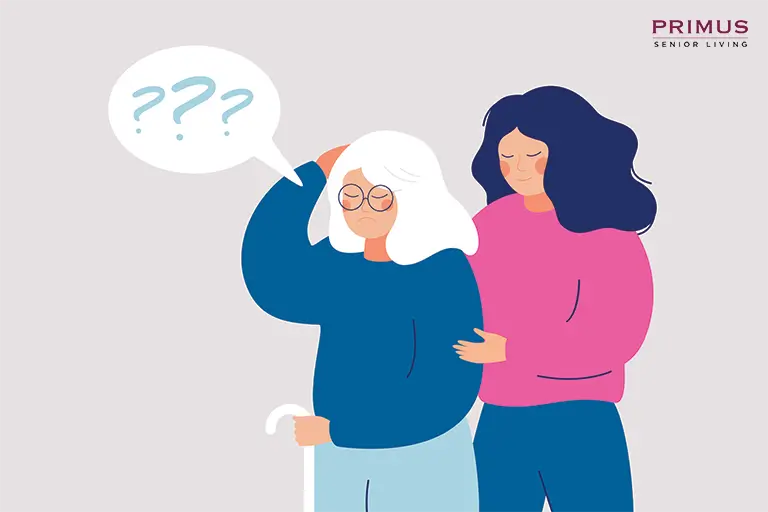Dementia is a condition that is usually chronic or progressive in nature that deteriorates cognitive function beyond what might be expected from normal ageing. It affects memory, thinking, orientation, comprehension, calculation, learning capacity, language and judgement. However, dementia does not affect the consciousness of a person. Deterioration in emotional control, social behaviour or motivation accompanies and occasionally precedes impairment in cognitive function. Dementia can be the result of a variety of diseases and injuries that primarily or secondarily affect the brain, like Alzheimer’s disease or stroke.
Identifying Early Signs of Dementia and Available Treatments
According to the World Health Organisation (WHO), Dementia is one of the major causes of disability and dependency among older people worldwide. There is often a lack of understanding when it comes to understanding Dementia. There is a social stigma attached to it which makes it difficult to treat and diagnose it.
Dementia ranges in severity from the mildest stage to the most severe stage. In the mildest stage it just begins to affect a person’s functioning and gradually deteriorates to the severe stage where the patient has to rely completely on others for basic activities of living. Dementia affects each person in a different way. The symptoms of Dementia include forgetfulness, losing track of time, and becoming lost in familiar places in the early stages.
In the progressive stages the symptoms become clearer and more restricting. The affected individuals show signs of forgetting recent events and names of people, getting lost at home, having increasing difficulty with communication, experiencing behaviour changes, including wandering and repeated questioning. They need extensive help with personal care. The late stage is characterised by near total dependence and inactivity.
Some of the late stages of Dementia include becoming unaware of the time and place, having difficulty recognising relatives and friends, having an increasing need for assisted self-care, having difficulty walking and experiencing behavioural changes that may escalate and include aggression.
Some of the major forms of Dementia include Alzheimer’s, Vascular Dementia and dementia with Lewy bodies. They often coexist as the boundaries between the various forms of dementia are indistinct. Some of the medications used to treat Dementia are, Cholinesterase inhibitors, memantine and other medications that control depression, sleep disturbances, hallucinations, parkinsonism and agitation. The therapies used to treat dementia include:
Occupational therapy: In occupational therapy, the therapist helps you to make your home safer and teach you coping behaviours. This will help reduce accidents such as falls. It will help with behaviour management and preparation for dementia progression.
Modifying the Environment: It helps with making the surrounding comfortable for the dementia patient by reducing cluttering noises, hiding objects that can threaten safety, and putting up monitoring systems to track the individual.
Simplifying tasks: It helps with breaking tasks into easier steps and focus on success. People with dementia can also be helped with structure and routine which reduces confusion in people.
Dementia can be overwhelming for families dealing with it. Physical, emotional and financial pressure can cause great distress among families and loved ones. Therefore, one should work closely with the doctors, therapists and caregivers so that they can effectively deal with dementia and uphold the patient’s choices and freedom.
With the right support and the right diagnosis, treating dementia is becoming possible. At Primus, our teams constantly monitor our senior residents to ensure that they are healthy and safe.
You may also like
.webp)
Room For Improvement: Why Learning A New Hobby At 60 Could Be The Answer To A Long And Happy Life
Activity is done during one's leisure time and fun has the capability to instantly boost one's mental health. That's why it is great to have a hobby. The brainpower in older people can be increased with the incorporation of new hobbies. Activities that have you completely involved makes the mind sharp and focused. When pursuing a new hobby it is important for people to push themself out of their comfort zone. When choosing a hobby, scrutinizing is important after a certain age. Passive hobbies such as listening to music or watching TV will not have a productive impact unlike reading, pottery, or learning photography. Creating challenging situations will leave the elderly feeling more alive. Elderly people usually face possible ailments, feelings of loneliness, and a general feeling of the curtain falling down. Empty-hours or post-retirement time is when older people should take up a new hobby to keep their mind alert.
READ MORE
Pain Management- An Integral Aspect Of Senior Health Care
The elderly population presents many challenges to medical practitioners, including severe and declining physical and medical conditions. The biggest myth is that pain is normal in elderly people. Many seniors feel that it's normal to feel pain as a part of growing old and so they do not report it on time. Pain in the elderly are either untreated or under-treated and these have a profound impact on their quality of life. Pain is one of the feared complications that accompany old age. It has a severe impact on the mood and functionality and often results in depression, anxiety, social isolation and sleep disturbances. Lack of training, inappropriate pain assessment and reluctance to prescribe opioid medicines also result in many elders living with chronic pain. There are various options for pain management available that can be used to manage varying levels and durations of pain for the elderly.
READ MORE

Leave a Comment